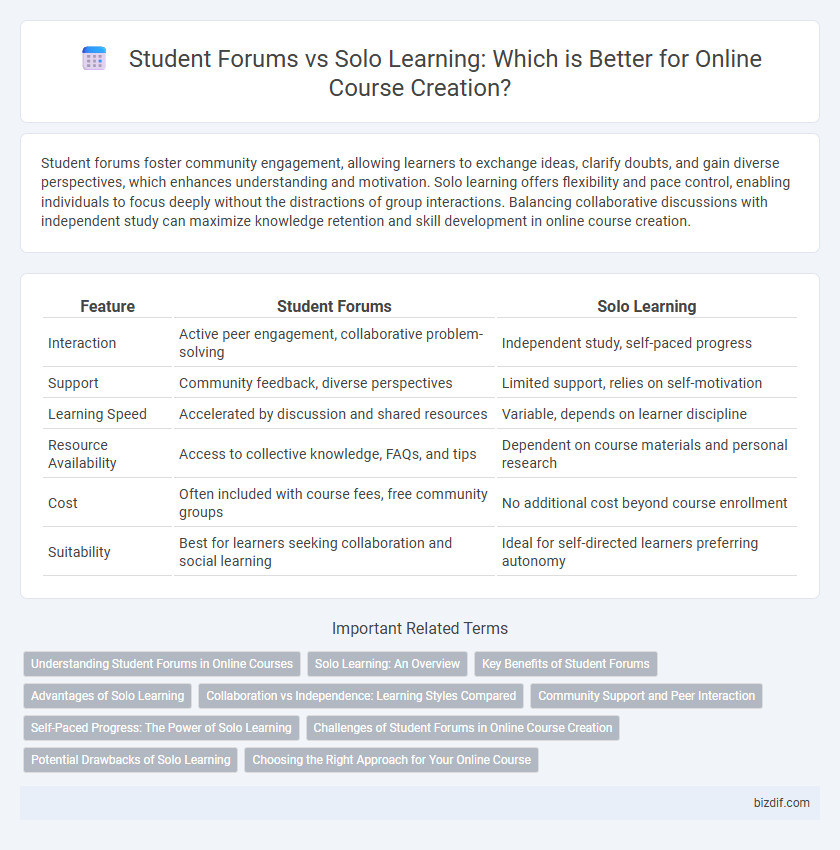Student forums foster community engagement, allowing learners to exchange ideas, clarify doubts, and gain diverse perspectives, which enhances understanding and motivation. Solo learning offers flexibility and pace control, enabling individuals to focus deeply without the distractions of group interactions. Balancing collaborative discussions with independent study can maximize knowledge retention and skill development in online course creation.
Table of Comparison
| Feature | Student Forums | Solo Learning |
|---|---|---|
| Interaction | Active peer engagement, collaborative problem-solving | Independent study, self-paced progress |
| Support | Community feedback, diverse perspectives | Limited support, relies on self-motivation |
| Learning Speed | Accelerated by discussion and shared resources | Variable, depends on learner discipline |
| Resource Availability | Access to collective knowledge, FAQs, and tips | Dependent on course materials and personal research |
| Cost | Often included with course fees, free community groups | No additional cost beyond course enrollment |
| Suitability | Best for learners seeking collaboration and social learning | Ideal for self-directed learners preferring autonomy |
Understanding Student Forums in Online Courses
Student forums in online courses enhance learner engagement by fostering collaborative discussions and peer-to-peer support, boosting comprehension and retention of complex topics. These interactive platforms offer diverse perspectives that solo learning often lacks, helping students troubleshoot challenges and deepen their understanding through collective knowledge. Research indicates that active participation in student forums correlates with higher course completion rates and improved academic performance in digital education environments.
Solo Learning: An Overview
Solo learning in online course creation offers students the flexibility to progress at their own pace, fostering deep focus and personalized comprehension without external interruptions. This method enhances self-discipline and encourages critical thinking by allowing learners to explore materials independently, tailoring their study patterns to individual needs. Numerous studies show solo learning supports retention and mastery, especially in complex subjects requiring intensive practice and reflection.
Key Benefits of Student Forums
Student forums foster collaborative learning by enabling peer-to-peer interaction and real-time problem-solving, significantly enhancing knowledge retention and engagement. Access to diverse perspectives and collective expertise accelerates skill development, making complex topics more approachable. Forums also create a supportive community that combats isolation, motivating consistent course completion and improved learning outcomes.
Advantages of Solo Learning
Solo learning allows students to progress at their own pace, tailoring study schedules to individual needs without external dependencies. This method fosters deep concentration and self-discipline, enhancing retention and comprehension of course material. Additionally, solo learning enables personalized exploration of topics, leading to a customized and flexible educational experience.
Collaboration vs Independence: Learning Styles Compared
Student forums foster collaboration by enabling peer-to-peer interaction, knowledge sharing, and diverse perspectives that enhance problem-solving skills. Solo learning emphasizes independence, allowing learners to progress at their own pace and develop self-discipline without external input. Both approaches cater to different learning styles, with forums supporting social and experiential learners, while solo study suits those who prefer introspection and individualized focus.
Community Support and Peer Interaction
Student forums foster community support and peer interaction by enabling learners to share insights, ask questions, and collaborate, which enhances understanding and motivation. Solo learning lacks this dynamic feedback loop, often leading to isolation and slower problem-solving progress. Engaging in active forums significantly improves retention rates and critical thinking skills compared to solitary study methods.
Self-Paced Progress: The Power of Solo Learning
Self-paced progress in online course creation empowers solo learning by allowing students to tailor their study schedules to individual needs, enhancing knowledge retention and focus. Unlike student forums that rely on group interactions and fixed timelines, solo learning fosters autonomy and deep concentration, facilitating mastery of complex topics. This personalized approach accelerates skill acquisition and adapts dynamically to each learner's pace and style.
Challenges of Student Forums in Online Course Creation
Student forums in online course creation often face challenges such as low engagement and off-topic discussions, which can hinder cohesive learning experiences. Inconsistent participation levels and lack of moderation may lead to confusion and misinformation among students. Effective management and structured guidelines are essential to maximize the benefits of collaborative learning environments within online courses.
Potential Drawbacks of Solo Learning
Solo learning in online course creation often results in limited peer interaction, reducing opportunities for collaborative problem-solving and feedback exchange. Students may experience decreased motivation and increased feelings of isolation, which can hinder consistent progress and engagement. The absence of diverse perspectives also restricts critical thinking development and deeper understanding of complex subjects.
Choosing the Right Approach for Your Online Course
Student forums foster interactive learning by enabling peer-to-peer discussions, which enhances knowledge retention and critical thinking skills. Solo learning offers flexibility and self-paced progress, ideal for learners who prefer independent study without distractions. Selecting the right approach depends on course objectives, learner preferences, and the desired level of engagement to maximize educational outcomes.
Student forums vs Solo learning Infographic

 bizdif.com
bizdif.com